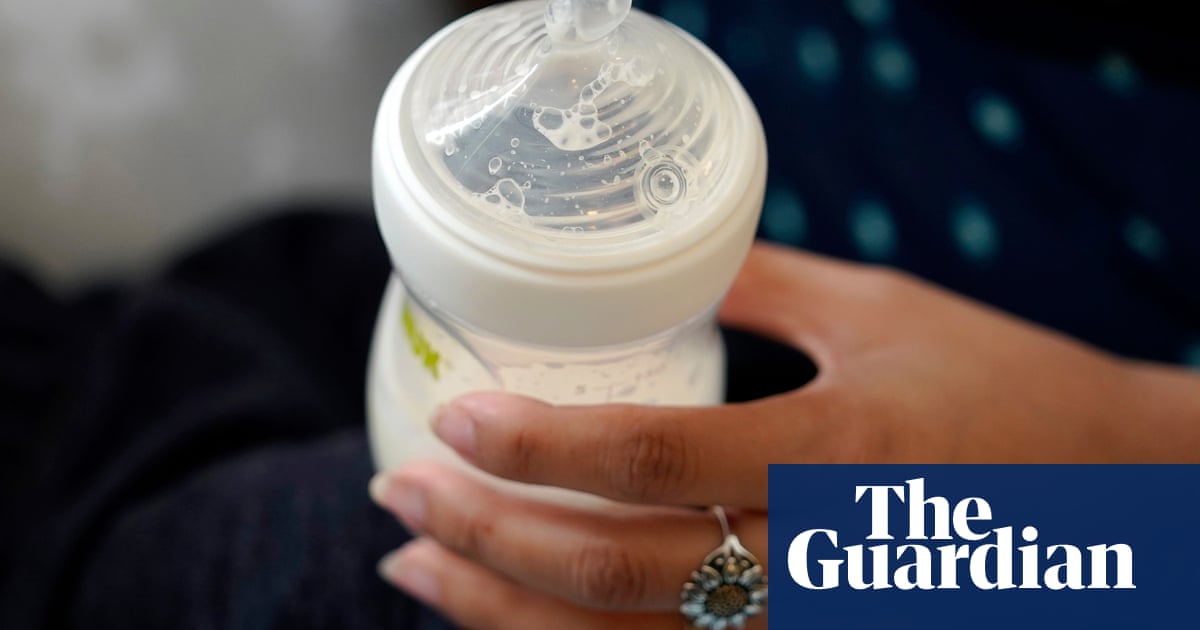
Baby formula should be placed in standardised packaging in hospitals and parents allowed to use gift vouchers and loyalty card points to buy formula milk, the UK competition watchdog has proposed as it tries to combat soaring prices and lack of choice in the market.
The Competition and Markets Authority (CMA) proposed five measures on Friday that it said would improve outcomes for parents and could allow them to save £300 a year by switching to a lower-priced brands, after a year-long study into the infant formula market.
They include standardising labelling of infant formula in hospitals or other healthcare locations to tackle the power of marketing on new parents, with formula put into non-branded containers, or the NHS could offer its own variety of baby milk.
However, the regulator decided against recommending regulations such as a price cap on formula or a profit-margin cap, which the Greek government did last year with the aim of making products more affordable.
The CMA said such a move would “involve significant risks” and could push up the prices of cheaper formula products to reach the ceiling, leading to some parents “missing out on cheaper options on the market”.
It also said a price cap could be difficult to implement, but that the government could keep this option as a “backstop” if its proposals did not manage to reduce prices.
The watchdog said parents often chose a brand of formula for their baby at a time when they were vulnerable, often in hospital immediately after birth, when they did not have “clear, accurate and impartial information needed to make informed decisions”. As a result, many chose a more expensive, branded product, as they assumed it would be higher quality, and then they remained loyal to that brand.
Sarah Cardell, the chief executive of the CMA, said many parents who “need, or choose, to formula feed, pick a brand at a vulnerable moment, based on incomplete information, often believing that higher prices must mean better quality”.
She added: “This is despite NHS advice stating that all brands will meet your baby’s nutritional needs, regardless of brand or price.”
Under the proposals, parents would be provided with more information in shops, with all brands displayed together, to remind them that all formula products meet babies’ nutritional and safety needs, while allowing them to make quick and easy price comparisons.
The CMA advised removing a restriction on parents buying baby milk in supermarkets using loyalty points and vouchers. However, it said the ban on advertising of formula should remain and be extended to follow-on milks, aimed at older babies.
Advertising of baby formula, as well as price reductions and deals, have been restricted to avoid discouraging breastfeeding.
The food retailer Iceland said it was launching new labels on shelves in 190 of its Food Warehouse stores, and online, on Friday to make it clear to parents that all infant formulas are nutritionally equal, irrespective of brand.
The executive chair of Iceland, Richard Walker, who has campaigned for changes to the formula market and previously called for a price cap, said the labelling initiative had been developed with the infant feeding charity Feed.
“All first infant formulas are nutritionally the same, and families deserve to know that,” Walker said, adding that the new labels were designed to provide “transparency, fairness and real change in the formula market”.
The CMA launched its investigation into the UK market in November 2023 after finding that manufacturers raised prices by as much as 36% on some brands in two years and managed to increase profit margins during the cost of living crisis.
The watchdog previously found that three companies – Danone, Nestlé and Kendal – accounted for more than 90% of the market.
A spokesperson for Danone UK said it would examine the CMA’s final recommendations, and welcomed the proposal that parents could be allowed to use loyalty card points when purchasing formula, adding that parents were penalised “unjustifiably” otherwise.
The formula maker HiPP Organic UK criticised the CMA’s report as a “missed opportunity”, adding that it did not believe the action would lead to changes in the formula market.
Emma Rossington, the managing director of HiPP Organic UK, said: “A blanket ban on advertising does not create healthier competition in this life-sustaining category, it limits it and removes a key source of information that parents tell us they rely on.”












